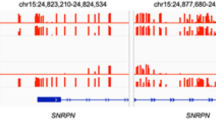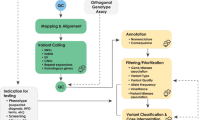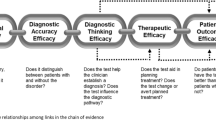Abstract
We are entering an era in which the cost of clinical whole-genome and targeted sequencing tests is no longer prohibitive to their application. However, currently the infrastructure is not in place to support both the patient and the physicians that encounter the resultant data. Here, we ask five experts to give their opinions on whether clinical data should be treated differently from other medical data, given the potential use of these tests, and on the areas that must be developed to improve patient outcome.
This is a preview of subscription content, access via your institution
Access options
Subscribe to this journal
Receive 12 print issues and online access
$189.00 per year
only $15.75 per issue
Buy this article
- Purchase on Springer Link
- Instant access to full article PDF
Prices may be subject to local taxes which are calculated during checkout
Similar content being viewed by others
References
Burson, C. M. & Markey, K. R. Genetic counseling issues in predictive genetic testing for familial adult-onset neurologic diseases. Seminars Pediatr. Neurol. 8, 177–186 (2001).
Evans, J. P. & Rothschild, B. B. Return of results: not that complicated? Genet. Med. 14, 358–360 (2012).
Biesecker, L. G. Opportunities and challenges for the integration of massively parallel genomic sequencing into clinical practice: lessons from the ClinSeq project. Genet. Med. 14, 393–398 (2012).
Kohane, I. S., Hsing, M. & Kong, S. W. Taxonomizing, sizing, and overcoming the incidentalome. Genet. Med. 14, 399–404 (2012).
Institute of Medicine of the National Academies. Integrating large-scale genomic information into clinical practice: workshop summary (National Academies Press, 2012).
Mennuti, M. T. Genetic screening in reproductive health care. Clin. Obstet. Gynecol. 51, 3–23 (2008).
Goldman, J. S. et al. Genetic counseling and testing for Alzheimer disease: joint practice guidelines of the American College of Medical Genetics and the National Society of Genetic Counselors. Genet. Med. 13, 597–605 (2011).
Burke, W. Genetic testing. New Engl. J. Med. 347, 1867–1875 (2002).
Patay, B. A. & Topol, E. J. The unmet need of education in genomic medicine. Am. J. Med. 125, 5–6 (2012).
Sifri, R. et al. Use of cancer susceptibility testing among primary care physicians. Clin. Genet. 64, 355–360 (2003).
Wideroff, L. et al. Physician use of genetic testing for cancer susceptibility: results of a national survey. Cancer Epidemiol. Biomarkers Prev. 12, 295–303 (2003).
Scheuner, M. et al. Are electronic health records ready for genomic medicine? Genet. Med. 11, 510–517 (2009).
Tversky, A. & Kahneman, D. Judgment under uncertainty: heuristics and biases. Science 185, 1124–1131 (1974).
Szolovits, P. & Pauker, S. G. Categorical and probabilistic reasoning in medical diagnosis. Artif. Intelligence Med. 11, 115–144 (1978).
Lin, Z., Altman, R. B. & Owen, A. B. Confidentiality in genome research. Science 313, 441–442 (2006).
Potter, N. T., Spector, E. B. & Prior, T. W. Technical standards and guidelines for Huntington disease testing. Genet. Med. 6, 61–65 (2004).
Johnston, J. J. et al. Secondary variants in individuals undergoing exome sequencing: screening of 572 individuals identifies high-penetrance mutations in cancer-susceptibility genes. Am. J. Hum. Genet. 91, 97–108 (2012).
Riley, B. D. et al. Essential elements of genetic cancer risk assessment, counseling, and testing: updated recommendations of the National Society of Genetic Counselors. J. Genet. Couns. 21, 151–161 (2012).
Plon, S. E. et al. Genetic testing and cancer risk management recommendations by physicians for at-risk relatives. Genet. Med. 13, 148–154 (2011).
Goldgar, D. E., Easton, D. F., Cannon-Albright, L. A. & Skolnick, M. H. Systematic population-based assessment of cancer risk in first-degree relatives of cancer probands. J. Natl Cancer Inst. 86, 1600–1608 (1994).
Biesecker, L. G. et al. The ClinSeq Project: piloting large-scale genome sequencing for research in genomic medicine. Genome Res. 19, 1665–1674 (2009).
Lesser, C. S., Lucey, C. R., Egener, B., Braddock, C. H., Linas, S. L. & Levinson, W. A behavioral and systems view of professionalism. JAMA 304, 2732–2737 (2010).
Kohane, I. S., Masys, D. R. & Altman, R. B. The incidentalome: a threat to genomic medicine. JAMA 296, 212–215 (2006).
Roberts, N. J. et al. The predictive capacity of personal genome sequencing. Sci. Transl. Med. 4, 133ra58 (2012).
Gahl, W. A. et al. The National Institutes of Health Undiagnosed Diseases Program: insights into rare diseases. Genet. Med. 14, 51–59 (2012).
Maxmen, A. Exome sequencing deciphers rare diseases. Cell 144, 635–637 (2011).
Mayer, A. N. et al. A timely arrival for genomic medicine. Genet. Med. 13, 195–196 (2011).
Berg, J. S. et al. An informatics approach to analyzing the incidentalome. Genet. Med. 27 Jul 2012 (doi:10.1038/gim.2012.112).
Hicks, J. K. et al. A clinician-driven automated system for integration of pharmacogenetic interpretations into an electronic medical record. Clin. Pharmacol. Ther. 19 Sep 2012 (doi:10.1038/clpt.2012.140).
Overby, C. L., Tarczy-Hornoch, P., Hoath, J. I., Kalet, I. J. & Veenstra, D. L. Feasibility of incorporating genomic knowledge into electronic medical records for pharmacogenomic clinical decision support. BMC Bioinformatics 11 (Suppl. 9), S10 (2010).
Guttmacher, A. E., Jenkins, J. & Uhlmann, W. R. Genomic medicine: who will practice it? A call to open arms. Am. J. Med. Genet. 106, 216–222 (2001).
Millot, G. A. et al. A guide for functional analysis of BRCA1 variants of uncertain significance. Hum. Mutat. 16 Jul 2012 (doi:10.1002/humu.22150).
Wright, C. et al. Next steps in the sequence: the implications of whole genome sequencing for health in the UK Ch. 12 153–160 (PHG Foundation, 2011).
Wright, C. et al. Next steps in the sequence: the implications of whole genome sequencing for health in the UK Ch. 4 33–44 (PHG Foundation, 2011).
Farley, T. A. Reforming health care or reforming health? Am. J. Public Health. 99, 588–590 (2009).
Committee on a Framework for Development a New Taxonomy of Disease; National Research Council. Toward precision medicine: building a knowledge network for biomedical research and a new taxonomy of disease (National Academies Press, 2011).
Qi, Q. et al. Sugar-sweetened beverages and genetic risk of obesity. N. Engl. J. Med. 21 Sep 2012 (doi:10.1056/NEJMoa1203039).
Acknowledgements
L.G.B. and the ClinSeq program are supported by the Intramural Research Program of the US National Human Genome Research Institute. S.E.P. acknowledges grant 1 U01 HG006485. R.Z. would like to thank M. Kroese and A. Hall, both of the PHG Foundation, for helpful discussion. The opinions expressed are the authors' own and do not necessarily reflect the views of the institutions with which they are affiliated.
Author information
Authors and Affiliations
Corresponding authors
Ethics declarations
Competing interests
Leslie G. Biesecker is an uncompensated consultant to and collaborator with the Illumina Corporation. Wylie Burke, Isaac Kohane, Sharon E. Plon and Ron Zimmern declare no competing financial insterests.
Related links
FURTHER INFORMATION
Rights and permissions
About this article
Cite this article
Biesecker, L., Burke, W., Kohane, I. et al. Next-generation sequencing in the clinic: are we ready?. Nat Rev Genet 13, 818–824 (2012). https://doi.org/10.1038/nrg3357
Published:
Issue Date:
DOI: https://doi.org/10.1038/nrg3357
This article is cited by
-
RNA sequencing reveals the expression profiles of circRNA and identifies a four-circRNA signature acts as a prognostic marker in esophageal squamous cell carcinoma
Cancer Cell International (2021)
-
Prognostic value of a five-lncRNA signature in esophageal squamous cell carcinoma
Cancer Cell International (2020)
-
Laboratory Approach to Hemolytic Anemia
The Indian Journal of Pediatrics (2020)
-
Protein‐coding genes combined with long noncoding RNA as a novel transcriptome molecular staging model to predict the survival of patients with esophageal squamous cell carcinoma
Cancer Communications (2018)
-
Clinical providers’ experiences with returning results from genomic sequencing: an interview study
BMC Medical Genomics (2018)



